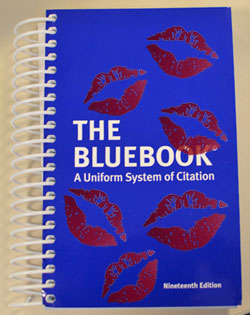 Carl Malamud of public.resource.org has a guest post on Boing Boing: Liberating America’s Secret, for-pay Laws. In it, he discusses the problem of laws that incorporate copyrighted technical standards by reference. Because the standards bodies that issue them are in the private sector, anyone who wants to view the standards (to comply with the law) must pay for a copy. Those copies can be very expensive; public.resource.org spent over $7,000 for copies of the corpus.
Carl Malamud of public.resource.org has a guest post on Boing Boing: Liberating America’s Secret, for-pay Laws. In it, he discusses the problem of laws that incorporate copyrighted technical standards by reference. Because the standards bodies that issue them are in the private sector, anyone who wants to view the standards (to comply with the law) must pay for a copy. Those copies can be very expensive; public.resource.org spent over $7,000 for copies of the corpus.
Search Results for: vendor neutral
 It’s been a great year for us at Justia, as we hope it has been for all of our Onward readers. We thought it might be fun to re-cap (not to be confused with RECAP ) some of the various new projects, pages and products we’ve worked on in 2011.
It’s been a great year for us at Justia, as we hope it has been for all of our Onward readers. We thought it might be fun to re-cap (not to be confused with RECAP ) some of the various new projects, pages and products we’ve worked on in 2011.
Verdict – In mid-2011, we launched our new legal commentary and analysis web site, Verdict. Each weekday, one of our team of ten columnists provides original and informed analysis of breaking news and developments in the law. Articles from Verdict this year included John Dean’s look at The Tea Party, Neil Buchanan’s piece on tax cuts for the wealthy, Sherry Colb’s examination of whether strip searches by jail officials are constitutional, and Vik Amar and Alan Brownstein’s analysis of the recent Proposition 8 ruling by the California Supreme Court. Other great pieces covered a wide variety of topics including immigration, criminal law, civil rights, constitutional law, health care, new technologies, and U.S. politics.
 A hat tip to our friend Ed Walters over at FastCase who alerted us to the news that Colorado has proposed adopting a public domain citation format for its Supreme Court and Court of Appeals published opinions. (Yay!) By our count, this means there will now be seventeen states using some form of universal / vendor neutral citation for their court opinions.
A hat tip to our friend Ed Walters over at FastCase who alerted us to the news that Colorado has proposed adopting a public domain citation format for its Supreme Court and Court of Appeals published opinions. (Yay!) By our count, this means there will now be seventeen states using some form of universal / vendor neutral citation for their court opinions.
A link to the proposal (in PDF) is here. Public comments are welcome on the proposed changes but must be in by December 12, 2011.
 As readers of this blog, you probably already know that we at Justia are big fans of universal citation. With that said, I wanted to give you all a heads up that Courtney, in continuing to fight that good fight, has written a great piece on the topic which is now up on Cornell’s VoxPopuLII blog. In it, she generally discusses media neutral citation and more specifically provides details of the work we’ve been doing here in applying universal citation to Justia’s corpus of state codes. Head on over and check it out!
As readers of this blog, you probably already know that we at Justia are big fans of universal citation. With that said, I wanted to give you all a heads up that Courtney, in continuing to fight that good fight, has written a great piece on the topic which is now up on Cornell’s VoxPopuLII blog. In it, she generally discusses media neutral citation and more specifically provides details of the work we’ve been doing here in applying universal citation to Justia’s corpus of state codes. Head on over and check it out!
Additional Links & Resources
UniversalCitation.org – current movement to provide the organizational infrastructure needed to facilitate the adoption and use of a uniform set of media and vendor neutral citations that can be used for all American court decisions. This site also has links to lots of great resources on the history and work that’s been done in the field so far.

Yesterday, the Supreme Court of Illinois announced that it will adopt a vendor-neutral citation system. According to the press release, the official citation of Illinois Supreme Court and Appellate Court opinions will change to a public-domain numbering and paragraph scheme.
Concurrently, the Illinois Supreme Court will also be discontinuing official printed volumes for Illinois state case law. “The official body of Illinois court opinions will now reside on the website of the Illinois Supreme Court, readily available to lawyers, judges and law clerks for official citation and to any member of the public who wishes to read them.” This will save private lawyers as well as the court system quite a fair amount of money now that judges, law libraries and law firms will no longer have to purchase and store hundreds of printed volumes. For those concerned about authentication issues surrounding online case law, this should quiet your fears since the opinions will come directly from the courts themselves.
![]() The Administrative Office of the US Courts issued a press release last week announcing that a “New Pilot Project Will Enhance Public Access to Federal Court Opinions.” According to the statement, select federal appellate and district courts will make their published opinions available on FDSys, as “FDSys can provide the public with a robust search engine that can search common threads across opinions and courts.” FDSys is run by the Government Printing Office (GPO), which issued a similar statement.
The Administrative Office of the US Courts issued a press release last week announcing that a “New Pilot Project Will Enhance Public Access to Federal Court Opinions.” According to the statement, select federal appellate and district courts will make their published opinions available on FDSys, as “FDSys can provide the public with a robust search engine that can search common threads across opinions and courts.” FDSys is run by the Government Printing Office (GPO), which issued a similar statement.
Let me start by saying I think this is a good thing. PACER has a lot of limitations, and moving opinions into a better search engine that is free to use and search is quite helpful. I like the idea of putting the bulk of government legal material (cases, codes, memos, etc.) into one database. It helps that the database will have the imprimatur of government on it, which will quiet the concerns about authentication that always pop up in these discussions.
 I want to follow up on a previous post I wrote back in October that, in part, discussed open access in scholarship and The Durham Statement. As a reminder, and for those of you who might be new to this party, The Durham Statement, “calls for all law schools to stop publishing their journals in print format and to rely instead on electronic publication coupled with a commitment to keep the electronic versions available in stable, open, digital formats.”
I want to follow up on a previous post I wrote back in October that, in part, discussed open access in scholarship and The Durham Statement. As a reminder, and for those of you who might be new to this party, The Durham Statement, “calls for all law schools to stop publishing their journals in print format and to rely instead on electronic publication coupled with a commitment to keep the electronic versions available in stable, open, digital formats.”
An article was published recently as a part of The University of Georgia Law School Research Paper Series, “Citation Advantage of Open Access Legal Scholarship,” which helps to further promote the proposition that opening up this secondary source material in digital format provides real benefits. Not only does this advance the greater philosophical principals of knowledge as a human right and a public good, but open access can positively impact the work and reputation of law faculty by supporting their professional goals to get their work published and, more specifically, cited, which is now a common benchmark used in tenure review.
 Have you heard that Judge Richard Posner hates the Bluebook? Of course you have. It’s been all over the blawgosphere lately. But thanks to the UGA Law Library Blog, which posted a direct link to the article, I actually read it. True to form, the article is brief, articulate, and humorous. As someone who is regularly frustrated by citation practices, I could appreciate Posner’s points. Particularly interesting is the inclusion of the style sheet that Judge Posner provides to his own clerks.
Have you heard that Judge Richard Posner hates the Bluebook? Of course you have. It’s been all over the blawgosphere lately. But thanks to the UGA Law Library Blog, which posted a direct link to the article, I actually read it. True to form, the article is brief, articulate, and humorous. As someone who is regularly frustrated by citation practices, I could appreciate Posner’s points. Particularly interesting is the inclusion of the style sheet that Judge Posner provides to his own clerks.
By far, the best tip I got out of his article was a reference to a terrific piece by Professor Ian Gallacher: Cite Unseen: How Neutral Citation and America’s Law Schools Can Cure our Strange Devotion to Bibliographical Orthodoxy and the Constriction of Open and Equal Access to the Law. 70 Albany Law Rev 491 (2007). Professor Gallacher argues that the current citation format fetish reinforces the West/LexisNexis caselaw duopoly:
I was researching case law on state court websites recently and surveying what’s out there and who’s publishing what, when I encountered something totally surprising: public domain citation formats. I thought I was pretty up-to-date on free law and access to public information, but I had never heard of this. I turned to my colleague Cicely, the Citation Geek, and asked her if she had heard of it. She was surprised, too.
It turns out that starting in 1996, state courts began creating their own citation systems, adding paragraph numbers to their opinions, and requiring citation to these opinions in their rules. The formats are called by various names: vendor neutral, universal, media neutral, and public domain. The citations are “vendor neutral” because they do not cite to a commercial reporter. They are “media neutral” because they can be used to cite electronic material (electronic access to public information was just ramping up in the late 90’s). They are “universal” and “public domain” because you do not need to rely on commercial publishers to get the official citation.
 It’s that special time of year, Justia friends, when we look back and share with you the most popular Onward blog posts of 2011.
It’s that special time of year, Justia friends, when we look back and share with you the most popular Onward blog posts of 2011.
Here they are:
